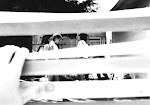I need to update my Shelfari bookshelf. Poor Shelfari thinks I've only read 5 books this year. In fact I'm always reading but I tend to only put up the ones that rise to a certain interest level. This week I read two books that I know I'll never forget, and one book that wasn't that great in itself, but which definitely started my creativity flowing.
I hate to admit it but I often avoid books that touch even a little on the Israel-Palestine thing, so while I'd heard of Amos Oz, the Israeli writer, I'd never read any of his novels. But I'm so glad I ran across A Tale of Love and Darkness, Oz's memoir of growing up in pre-state of Israel Jerusalem. It focuses on his mother, who loved to tell him stories, and his more skeptical father, and the world of their neighbors, refugees from a now-lost Europe. Oz is a master writer, and he moves back and forth in time, calling up now a girls' school in 1920s Poland, now life on a kibbutz in the 1950s, now 1990s Israel, all the while trying to understand the factors that led to his mother's suicide when he was 12.
Anna Anderson spent most of her life pretending to be Anastasia Romanov (at least if you believe the DNA tests) and her story is told in A Romanov Fantasy: Life at the Court of Anna Anderson by Frances Welch. It's an entertaining book -- Anna ended her life as a Crazy Cat Lady, and the man she married to gain US citizenship was nutty as a fruitcake himself. The problem I had with this book was that it just told the story without going any deeper. I'd like to know why Anna fooled so many people for so many years -- why did the people who supported her (and were usually badly treated by her) need to believe she was Anastasia? What did she represent to them and to the moviemakers, etc. who told her story? Even her surburban neighbors late in life believed she was Anastasia. Why? Well, the book doesn't answer these questions but it's such a fascinating story -- identity and imposters and what terms like nobility and royalty are really supposed to signify -- that I've filed it away for the future.
The last book is The City of Trembling Leaves by Walter Van Tilburg Clark, a genuine Nevada writer (famous for The Ox-Bow Incident.) It was written in 1945 and is one of those big, satisfying mid-century novels about growing up (i.e., S-E-X) and, in particular, discovering yourself as an artist and struggling to create something lasting and meaningful. The city of the title is Reno, and the book will make you fall in love with it, and Carmel, and Death Valley and the entire West. It's a little bit like Thomas Wolfe in places, and in others Willa Cather and I can tell it's one of those books I'm going to read over and over.
Thursday, May 27, 2010
Subscribe to:
Post Comments (Atom)








1 comment:
The last book you mention grabs my interest. The title is intriguing, and your description is good.
Post a Comment